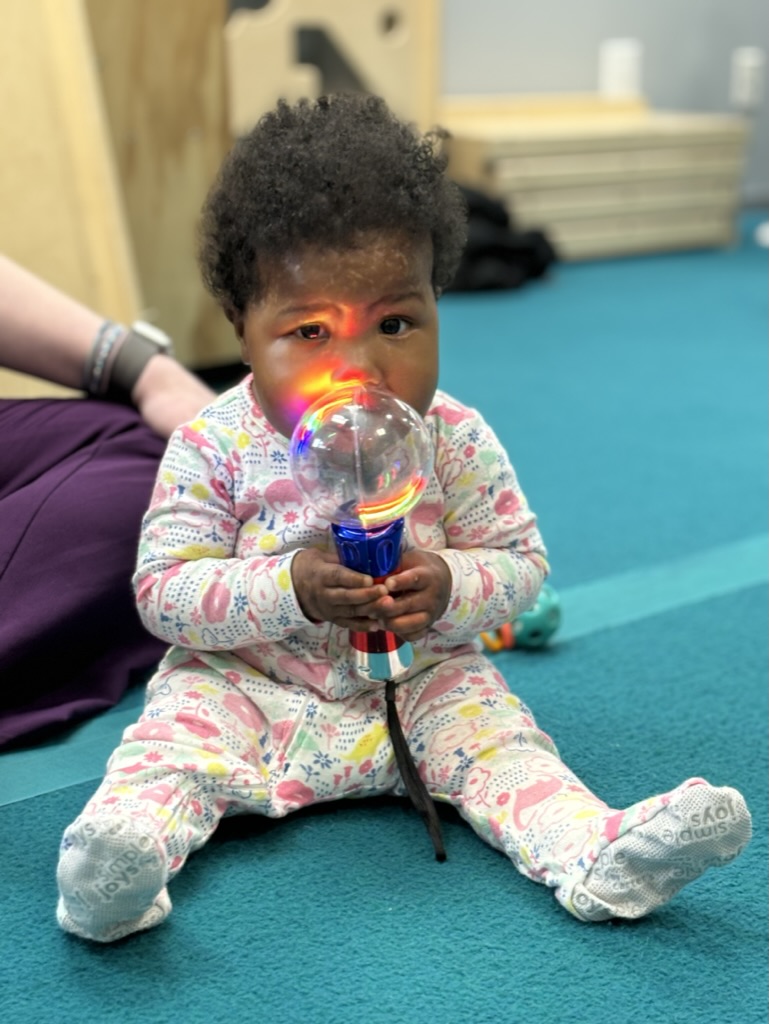
This friend is engaged in some adorable sensory exploration!
Sensory Processing Milestones: Your Baby's First Year
How is my baby processing the world?
When they are first born, the little one cradled in your arms is still learning his or her own sensory capabilities— and this information may be overwhelming to them! Each of your baby’s senses— sight, sound, taste, smell and touch — are developing faster in the coming 12 months than they will ever again, over the course of their lifetime. While these milestone indicators may not be as obvious as babbling or crawling, they are still crucial to your little one’s development and how they interact with the world around them. In this blog, we’ll dive into the sensory milestones of your baby’s first year.
1 – 3 Months
It’s called the fourth trimester for good reason— shortly after birth, as you are adjusting to the realities of parenthood, your baby is coming to terms with a barrage of sensory input. As these first three months pass by, they’ll begin to get a grasp on their ability to perceive the world around them. At this stage, you may notice:
- Lying on their back, your baby can visually track a toy from side to side
- Keeping their head centered to watch faces or toys.
- Calming down with rocking, touching and gentle sounds (soft shushing, lullabies, etc.)
Get ready to be the star of the show, because at this phase, there’s nothing that your baby loves more than the sight of your face! As their sight develops, faces are commonly indicated as one of the first objects that babies can see clearly. When being expressive with your baby, not only are you bonding, you’re helping their senses develop.
4 – 6 Months
Within the fourth to sixth month, your baby will love to be on the move— if not on their own, then with some help from you (or perhaps a rocking seat). They are also growing increasingly curious about their environment. Within this timeframe, they’ll likely begin to exhibit some of the following traits:
- Using both hands to explore toys and other objects
- Bringing hands and objects to their mouth (watch out for smaller items!)
- Sounds become associated with their source— your baby may begin trying to mimic commonly-heard noises in your home.
As your baby’s awareness of the world around them increases, it’s a great time to begin telling them the names of the things they are the most curious about. Repetition is key to the development of language, and it’s never too early to begin to help your child begin developing these crucial connections.
7 – 9 Months
The name of the game from seven to nine months is simple: coordination! At this phase, your little one is starting to understand their motor movements and how they can exert their influence on what they do next. As these skills develop, watch for:
- Hand-eye coordination skills on the rise: it’s a great time for peek-a-boo!
- Observing their environment from a variety of positions such as on their back, tummy, or while crawling.
- Turning pages of a chunky board book on their own.
Textures may become quite popular with your baby during this phase as well. Give them the chance to explore different tactile sensations like velcro, mesh or leather. In a similar vein, it’s a good time to try new textures and flavors with food. Millions of videos online showcase the excitement (and sometimes, disgust) of babies trying new flavors. Use them as inspiration, (or a very adorable rabbit-hole). Just remember to avoid honey and cow’s milk!
10 – 12 Months
By the time their first birthday rolls around, your little one has started to master his or her understanding of how they process and interact with their environment. Now, they want to be masters of themselves! At this age, your baby may begin to showcase their budding independence in some of the following ways:
- Feeding themselves (holding a bottle or picking up food with thumb and index fingers).
- Cooperating with being dressed and undressed.
- Putting objects into other objects (e.g blocks into a bucket).
One way to help your child on his or her journey towards independence is by showing them a simple cause and effect — lightly tap a noise-making toy to demonstrate and watch how quickly they discover the gimmick for themselves. Pro tip: make sure the toy in question has a good “hiding space” when not in use, to avoid a late-night or early-morning jump-scare.
Proprioception and the Vestibular System
Humans actually have seven senses, as opposed to five. Unlike senses like sight, taste and touch, which are external, the vestibular system and our sense of proprioception help us to process sensations internally.
The vestibular system uses the motion of fluid in our inner ears to tell us where our head is in space, which allows us to coordinate eye movements, posture, balance and more. This system begins developing in the womb. Once a child is born, any motion that changes his or her position, such as gentle rocking, swaying or rolling contributes to the development of a healthy vestibular system.
Proprioception is the awareness of where different body parts are, both in relation to each other and to gravity— this sense is what gives us awareness of how much force to use when pushing, pulling or picking up an object. You can help develop this sense by practicing coordinated movements, such as lifting the opposing leg and arm at the same time, or using activities that involve pushing and pulling.
What If My Child Processes Differently?
Don’t panic, dospeak up. All humans process their environment in slightly different ways, and while the reason your child may not meet these milestones is unclear, you have access to a number of resources— many in your own community.
Here in the Triangle, we have a number of free resources available for new & expectant parents, such as:
- TAPS (Triangle Area Parenting Support):A nonprofit organization dedicated to providing new parents with critical resources and a community of support (website also available en Español)
- MSM (Moms Supporting Moms): A Triangle-based organization supporting expectant and postpartum moms through the transition of baby’s first year and beyond
- FSN NC (Family Support Network of North Carolina): An organization providing family support services, local programs and parent mentors to parents of children with disabilities, special healthcare needs, or mental health challenges.
Here at Therapy Smarts, our mission is to turn challenges into triumphs for children and their families. We are experienced at helping parents find the answers they need to help their child thrive.
If you are concerned about your child’s sensory processing, we offer free screenings. Give us a call at(919) 378-1340to learn more!


